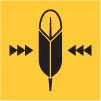Mentorship in Native Country
By: Brittany Gene
Tribal affiliation: Diné
Study: ’21 MS Industrial Design
When you’re the oldest of all your siblings, cousins, nieces and nephews, you automatically become the leader of the pack. It’s not a life you chose, it’s a life that chooses you. As the eldest child, it’s your job to take care of the pack and teach them lessons that you might’ve not received. It was the most basic form of mentorship.
I’d like to say I grew up translating my childhood leadership experience into a skill, but unfortunately that wasn’t the case. My father had a job in Phoenix and my mother enrolled me into a Tempe school district. I was far from what I considered my home and no one I knew looked like me or even came close to understanding me. When survival was the focus, leadership was an afterthought.
It wasn’t until college and with the help of a mentor that I could feel my leadership instincts kick back in. At first I was nervous to let my guard down because of my previous experiences with the public school system, but then I met Amanda Tachine (Diné) in 2008 when I was an undergraduate attending the University of Arizona. She was my first and only female Native mentor. She wasn’t like others in my past who tried to toss a generic formula at me– she did things the Native way. In one instance I remember coming to her office worried because I had almost no money for food and other expenses. Instead of telling me to “apply” and overwhelming me with a list of things to do, she sat me down and we prayed to the Creator. It was the first time I experienced prayer as a tool of resilience. Later on in life, when I was contemplating a giant career change, Dr. Tachine was there to root me on. It had been some time since I had last seen her and our lives had changed so much, but nonetheless I could not find a bigger supporter. I cherish our mentor relationship.
Now, as a graduate student, I realize the need for more Dr. Tachines in the world. We need more Native mentors to help bridge the gaps for our Native youth. I’m at the stage in my life where I’m now taking the role of mentor and it’s been challenging. I always thought there would be a day that I’d be a confident, all-knowing elder, but that’s not how it works. There are days I have so many questions on what it means to be a leader and a mentor. Other days I question if I’m “Native enough” to even be a mentor for Indigenous people. Those days are the hardest.
In moments like these, I use prayer to ground myself and fight against the insecurities others have placed in me. I also reflect on my mother’s words, “Be the best Brittany you can be.” While it’s simple advice, it speaks truths in so many forms. As a mentor, your job is not to know everything– it’s to empower and instill your knowledge, and be the best you in that moment. What you hold in your heart and mind is rare and beautiful because it’s uniquely yours. That’s why it is so important that we have Indigenous mentors who share their experiences because the Native experience is unlike any other. So this is my invite to you, to take the journey with me on becoming a mentor. We might slip, we might fall, but each experience only adds to the strength and knowledge we will pass on.
